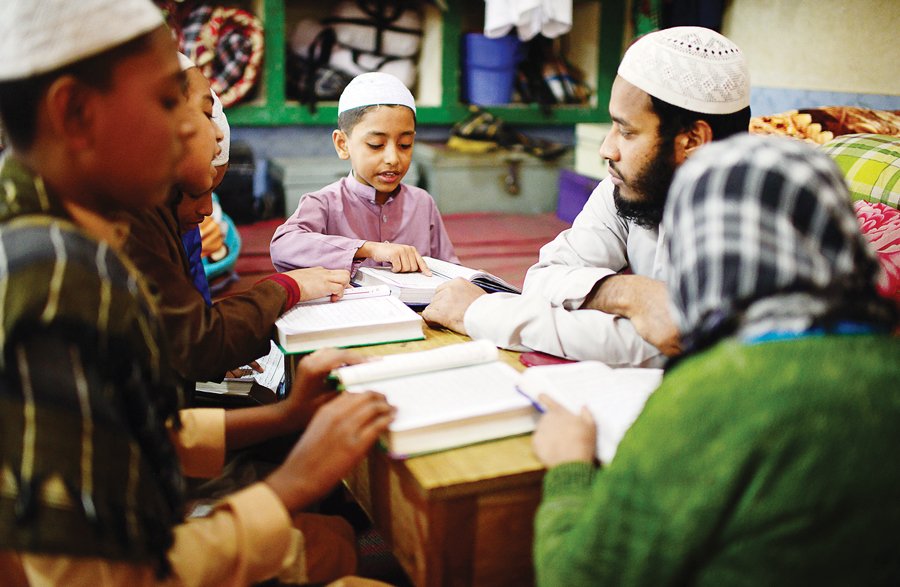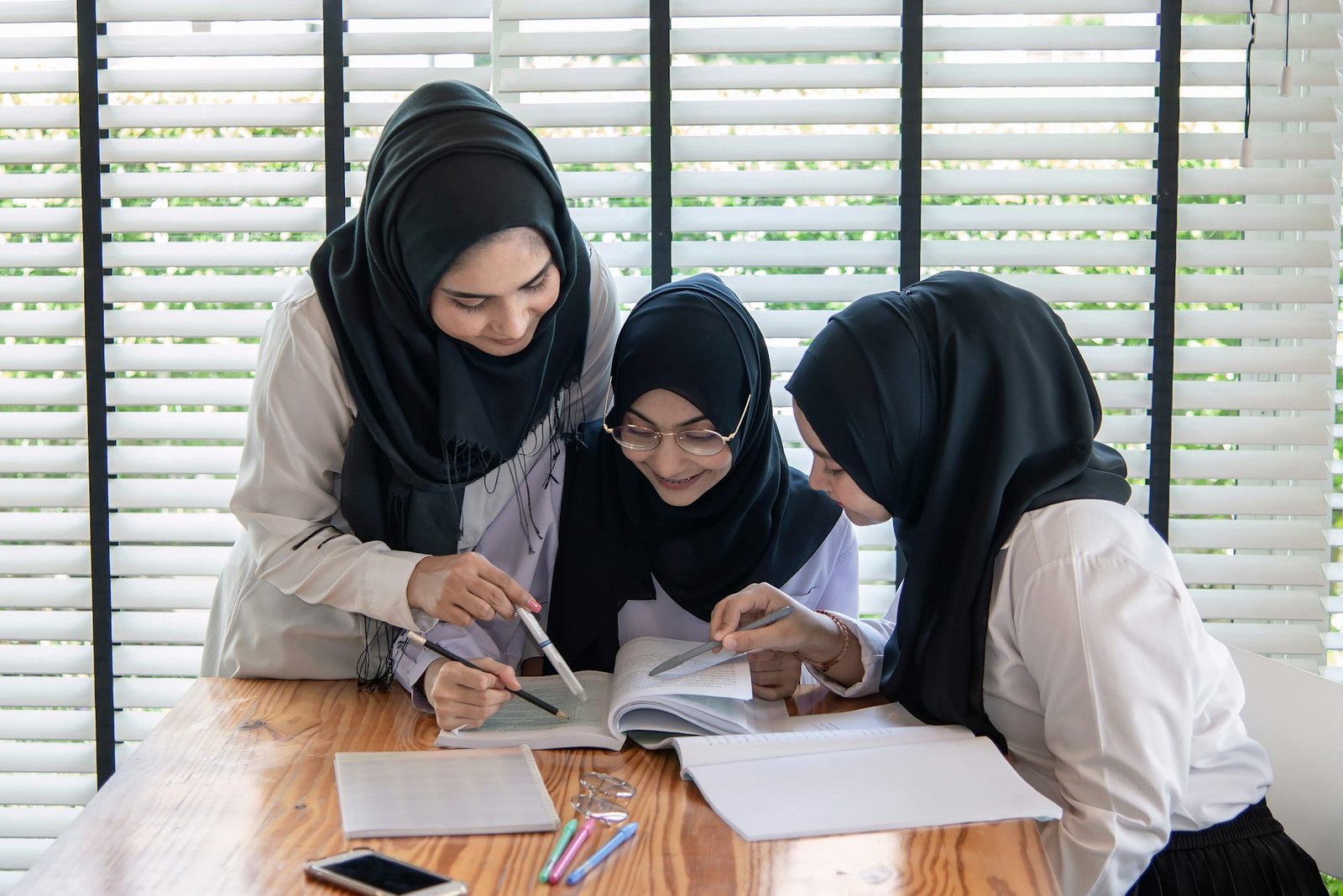Islamic topics for students hold profound significance for students, offering insights into ethics, spirituality, history, and contemporary issues.
These subjects not only deepen their understanding of Islamic principles but also foster personal growth and academic enrichment.
From exploring the ethical framework that guides behavior towards others to delving into the spiritual practices that nurture a sense of purpose, students engage with a diverse array of topics that highlight Islam’s cultural heritage and contributions to global discourse.
In today’s interconnected world, understanding these themes equips students with a nuanced perspective on societal challenges and the role of Islam in shaping global affairs.
Educational institutions play a pivotal role in facilitating this exploration, encouraging critical thinking and dialogue that promote tolerance and respect for diverse viewpoints within the Islamic tradition.
Islamic topics for students not only broaden their knowledge but also empower them to apply these principles in their communities and contribute positively to a globally interconnected society.
BOOK FREE SESSION
Islamic topics for students in urdu

Islamic topics for students can include:
- Importance of Salah (Prayer): Discussing the significance of performing salah regularly and its spiritual benefits.
- Life of Prophet Muhammad (PBUH): Exploring the biography of Prophet Muhammad (peace be upon him) and his teachings
- Concept of Tawheed (Oneness of Allah): Understanding the central belief in Islam regarding the oneness of Allah.
- Ramadan and Fasting: Learning about the importance of Ramadan Fasting, and its spiritual and physical benefits enriches understanding of Islamic topics for students.
- Islamic Ethics and Morality: Exploring Islamic teachings on ethics, honesty, kindness, and respect for others.
- Quranic Studies: Studying the Quranic verses, their meanings, and their application in daily life.
- Islamic History: Delving into significant events and personalities in Islamic history and their relevance today.
Interesting Islamic topics to discuss
Discussing interesting Islamic topics can be an effective way to engage both young people and adults, and to deepen their understanding of Islam. One of the interesting Islamic topics to discuss is ethics in Islam, where you can talk about the values that the religion promotes, such as honesty, integrity, and justice. This topic can serve as an entry point to discuss how these values can be applied in daily life.
Another topic within interesting Islamic topic to discuss is the role of science in Islam. You can explore how Muslim scholars contributed to advancements in fields such as medicine, astronomy, and mathematics, and discuss the lasting impact of these achievements on the world today. These discussions foster pride in Islamic heritage and encourage the pursuit of knowledge.
Discussing human rights in Islam is also one of the interesting Islamic topics to discuss. This topic allows for conversations about how Islam respects human rights, including the rights of women, children, and minorities. These discussions help dispel misconceptions and promote a correct understanding of Islamic teachings.
Lastly, it is beneficial to discuss the scientific miracles in the Quran as part of interesting Islamic topics to discuss. You can explore verses that describe natural phenomena and the alignment between these verses and modern scientific discoveries. This reinforces belief in the sacredness of the Quran and encourages contemplation and reflection on its verses.
Interesting Islamic stories

Islamic tradition is rich with captivating stories that exemplify moral lessons, historical events, and spiritual insights. One of the most renowned stories is that of Prophet Muhammad’s Night Journey (Isra and Mi’raj), where he traveled from Mecca to Jerusalem and ascended to the heavens, meeting previous prophets and receiving instructions from Allah. This miraculous journey symbolizes the spiritual ascension and reaffirms the significance of prayer in Islam. Another compelling story is that of Prophet Yusuf (Joseph), whose tale of betrayal, resilience, and eventual triumph demonstrates the themes of forgiveness, patience, and divine providence. The story of Prophet Musa (Moses) and his confrontation with Pharaoh, along with the parting of the Red Sea, showcases courage, faith, and liberation from oppression. Additionally, stories from Islamic history include the accounts of scholars, saints, and rulers whose lives exemplified piety, wisdom, and justice, leaving lasting legacies in Islamic civilization. These interesting Islamic stories not only entertain but also educate, offering profound insights into faith, morality, and the human condition.
BOOK FREE SESSION
Islamic topics for secondary school students:
Islamic topics suitable for secondary school students include:
- Life of Prophet Muhammad (PBUH): Detailed exploration of the Prophet’s biography, teachings, and his role as a model for Muslims.
- Fiqh (Islamic Jurisprudence): Introduction to basic principles of Islamic law and how they apply to daily life.
- Islamic History: Studying key events, civilizations, and contributions of Muslims throughout history.
- Ethics and Morality: Understanding Islamic values such as honesty, justice, kindness, and respect for others.
- Contemporary Issues: Discussing relevant Islamic topics for students like social justice, environmental stewardship, and ethical dilemmas from an Islamic perspective.
- Comparative Religion: Comparing Islam with other faiths to foster understanding and tolerance.
These Islamic topics for students aim to deepen students’ understanding of Islam, its principles, and its relevance in contemporary society while promoting critical thinking and ethical awareness in Islamic topics for students.
10 Tips for Discussing Islamic Topics
Start with Basics: When engaging in a conversation about Islam, begin with the fundamental principles. This ensures everyone has a clear understanding. This approach is essential when exploring interesting Islamic topics to discuss.
Use Authentic Sources: Always refer to the Quran and Hadith for accurate information. Using reliable sources helps maintain credibility, especially when addressing interesting Islamic topics to discuss.
Encourage Open Dialogue: Create an environment where participants feel comfortable sharing their thoughts and asking questions. Open dialogue is crucial for delving into interesting Islamic topics to discuss.
Relate to Daily Life: Connect Islamic teachings to everyday experiences. This makes the discussions more relevant and engaging, particularly when focusing on interesting Islamic topics to discuss.
Incorporate Stories: Utilize stories from the lives of prophets and companions. Storytelling can make the conversation more engaging and memorable, enriching the exploration of interesting Islamic topics to discuss.
Respect Different Opinions: Be open to different perspectives and interpretations within Islamic teachings. Respectful discussions foster a deeper understanding of interesting Islamic topics to discuss.
Use Visual Aids: Incorporate videos, images, and diagrams to illustrate points. Visual aids can enhance understanding and keep the audience engaged while discussing interesting Islamic topics to discuss.
Stay Relevant: Focus on contemporary issues that relate to Islamic teachings. Discussing current events can make the topics more relatable and interesting, enhancing the appeal of interesting Islamic topics to discuss.
Encourage Critical Thinking: Ask thought-provoking questions and encourage participants to reflect deeply. Critical thinking is vital for meaningful discussions on interesting Islamic topics to discuss.
Be Patient and Understanding: Recognize that everyone is at a different stage in their understanding of Islam. Patience and empathy are key to productive discussions, especially when navigating interesting Islamic topics to discuss.
Understanding Ethics and Philosophy in Islam through Interesting Islamic Topics to Discuss
Examining the ethical and philosophical foundations of Islam reveals rich discussions on Islamic ethics, moral philosophy, theology, and jurisprudence. Topics include Islamic concepts of justice and compassion, the nature of God and divine attributes, the pursuit of knowledge through reason and revelation, the development of Islamic law, and the mystical dimensions of Sufism. Engaging with these subjects deepens appreciation for the guiding principles and intellectual traditions of Islam.
Project topics for Islamic Topics for Students:
Here are some project topics suitable for Islamic Studies students:
- Comparative Study of Islamic Ethics and Western Ethics: Analyzing the similarities and differences between ethical principles in Islam and Western philosophical ethics.
- Impact of Islamic Civilization on Science and Technology: Investigating the contributions of Islamic scholars to fields such as astronomy, mathematics, medicine, and architecture during the Islamic Golden Age.
- Women’s Rights in Islam: Exploring the rights and roles of women in Islamic teachings, historical contexts, and contemporary debates.
- Interfaith Dialogue in Islam: Studying the principles of interfaith dialogue in Islam, historical examples, and contemporary efforts towards promoting understanding among different religious communities.
- Islamic Banking and Finance: Analyzing the principles of Islamic finance, its ethical framework, and comparing it with conventional banking systems.
- Hajj: Pilgrimage to Mecca: Investigating the rituals, significance, and impact of Hajj on individuals and the Muslim community globally.
- Islamic Art and Architecture: Studying the evolution, styles, and symbolism in Islamic art and architecture across different regions and time periods.
BOOK FREE SESSION
The Role of Women in Islamic History Highlighted as Interesting Islamic Topics to Discuss
Examining the roles and contributions of women in Islamic history reveals their often-overlooked influence. Topics include the lives of prominent women like Khadijah and Aisha, women’s rights as outlined in the Quran and Islamic law, the achievements of female scholars and mystics, women’s participation in historical movements, and contemporary activism and leadership. These discussions provide a nuanced understanding of the pivotal roles women have played in Islamic history and modern Muslim societies.

Islamic studies topics for youth:
Here are some Islamic studies topics suitable for youth:
- Prophet Muhammad (PBUH) as a Role Model: Exploring the life, character, and teachings of Prophet Muhammad (peace be upon him) and how they can inspire young Muslims today.
- Understanding Salah (Prayer): Explaining the importance of salah, its spiritual benefits, and practical tips for improving one’s prayer habits.
- The Five Pillars of Islam: Studying each pillar (Shahada, Salah, Zakat, Sawm, Hajj) in detail, their significance, and how youth can incorporate them into their lives.
- Islam and Social Justice: Discussing Islamic teachings on fairness, equality, compassion, and social responsibility, and how youth can adcommunities.
- Digital Ethics in Islam: Discussing Islamic perspectives on using technology responsibly, online behavior, and navigating the digital world in accordance with Islamic values.
- Personal Development in Islam: Studying concepts such as self-discipline, gratitude, humility, and resilience from an Islamic perspective, and their importance in personal growth.
- The Concept of Halal and Haram: Explaining what is permissible (halal) and prohibited (haram) in Islam, and how youth can make informed choices in their daily lives.
- Leadership and Service in Islam: Discussing qualities of leadership according to Islamic teachings, and how youth can contribute positively to their communities through service and activism.
-
Interesting questions to ask about Islam
There are many fascinating topics discussed in Islam, there are several questions that are discussed about Islam, including the following
- What are the Five Pillars of Islam, and how do they guide a Muslim’s life?
- How do Islamic art and architecture reflect spiritual beliefs and cultural identity?
- What role does Ramadan play in the life of a Muslim, and how does it foster spiritual growth?
- How does Islamic law (Sharia) influence social and personal ethics within Muslim communities?
- What are the key differences between Sunni and Shia Islam, and how do these impact religious practices and beliefs?
- How does Hajj, the pilgrimage to Mecca, symbolize unity and equality among Muslims worldwide?
- What are the major contributions of Islamic scholars to fields such as science, medicine, and philosophy during the Golden Age of Islam?
- How does Islam view diversity and pluralism within societies, and what teachings promote tolerance and coexistence?
- What are the main beliefs about the afterlife in Islam, and how do they influence daily life and moral decisions?
- How has Islam influenced global history and shaped interactions between different cultures and civilizations?
Read more:
basic islamic knowledge for toddlers
Free Islamic classes for sisters online
BOOK FREE SESSION
FAQ about Islamic topics for students
When Should Islamic Topics for Students?
Students can study Islamic topics at various times, including:
- Regular Study Sessions: Incorporating Islamic studies into their regular academic schedule, such as during designated classes or study periods.
- Daily Reflection: Setting aside time each day for personal reflection and study of Islamic teachings, perhaps after salah (prayer) or before bedtime.
- Weekend Programs: Participating in weekend Islamic schools or programs like shaikh saleh academy that offer structured learning and discussions on Islamic topics for students.
- Family Time: Utilizing family gatherings or meal times to discuss and learn about Islamic principles and stories from the Quran and Hadith.
- Special Occasions: Taking advantage of special Islamic occasions like Ramadan, Hajj, Eid, and Islamic holidays to deepen their understanding of related topics.
- Community Events: Engaging in Islamic lectures, seminars, and workshops organized by mosques or community centers to learn from scholars and educators.
Where can students find inspiration for their learning?
Students can find inspiration for their learning in several places:
- Books and Literature: Reading books, articles, and literature related to their field of interest or study can provide new perspectives and ideas.
- Role Models: Learning about and from successful individuals who have achieved great things in their field can inspire students to aim high and persevere.
- Teachers and Mentors: Engaging with knowledgeable teachers and mentors like shaikh saleh academy who are passionate about their subjects can motivate students and provide valuable guidance.
- Nature and Exploration: Spending time outdoors, observing the natural world, and exploring new environments can spark curiosity and creativity.
- Art and Creativity: Participating in artistic activities such as painting, music, or writing can stimulate the mind and foster innovative thinking.
- Personal Experiences: Drawing inspiration from personal experiences, challenges overcome, and lessons learned can fuel determination and dedication to learning.
- Travel and Culture: Experiencing different cultures, traditions, and histories through travel or cultural events can broaden students’ perspectives and inspire them to learn more about the world.
Where Can Students Find Inspiration to Explore Islamic Topics?
Students can find inspiration to explore Islamic topics in several ways:
- Quran and Hadith: Studying and reflecting on verses from the Quran and teachings from Hadith can provide profound insights and inspiration for deeper exploration of Islamic topics for students.
- Biographies of Prophets and Scholars: Reading about the lives and contributions of prophets, companions of the Prophet Muhammad (PBUH), and renowned Islamic scholars can inspire students to delve into specific aspects of Islamic history and knowledge.
- Islamic Art and Architecture: Exploring the beauty and symbolism in Islamic art, calligraphy, and architecture can ignite curiosity about Islamic culture and history.
- Islamic Lectures and Talks: Attending lectures, sermons, and talks by knowledgeable scholars and educators can provide guidance and inspiration for studying various Islamic topics for students.
- Islamic Literature and Poetry: Reading classical and contemporary Islamic literature, poetry, and spiritual writings can offer different perspectives and inspire reflection on Islamic themes.
By actively seeking inspiration from these sources, students can develop a passion for exploring Islamic topics for students, deepen their understanding of Islamic teachings and principles, and strengthen their connection to their faith and heritage.
Why Are Islamic Topics for Students Important?
Islamic topics are important for students for several reasons:
- Critical Thinking: Exploring Islamic topics encourages critical thinking and analytical skills as students engage with complex theological, historical, and philosophical concepts. It promotes intellectual curiosity and open-mindedness.
- Global Awareness: Islam is a global religion with followers from diverse backgrounds and cultures.
Studying Islamic topics for students enhances students’ understanding of global issues, interfaith relations, and the interconnectedness of societies.
- Practical Application: Islamic teachings offer practical guidance on various aspects of life, including personal conduct, family relations, social justice, and environmental stewardship.
Students can apply these teachings to navigate challenges and make positive contributions to society.
- Promotion of Peace and Harmony: Learning about Islamic topics, including teachings on tolerance, compassion, and respect for diversity, promotes peaceful coexistence and interfaith dialogue. It equips students with tools to foster harmony in multicultural societies.
In summary, Islamic topics for students are important because they nurture spiritual growth, ethical development, cultural appreciation, community identity, critical thinking skills, global awareness, practical wisdom, and the promotion of peace and harmony in society.
READ MORE:
Islamic Studies topics for kids